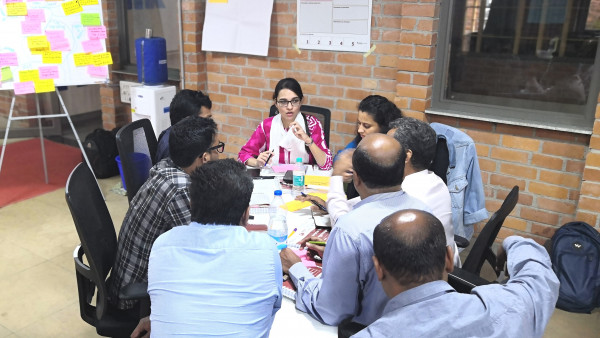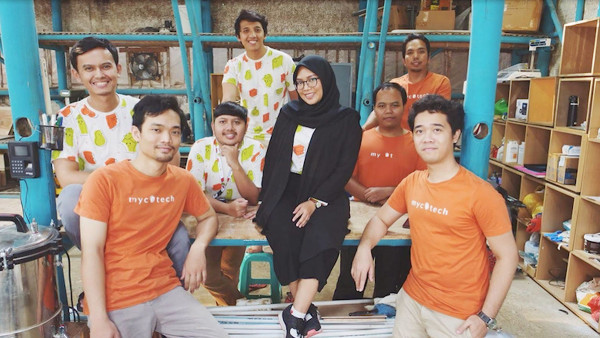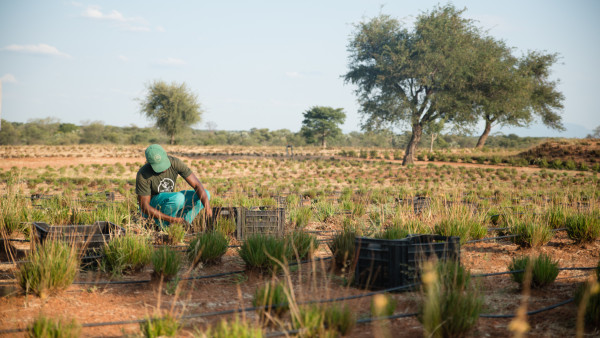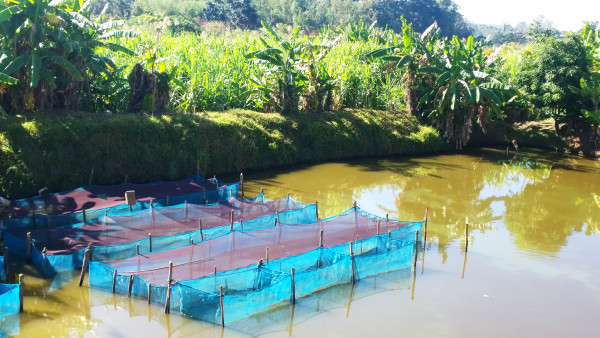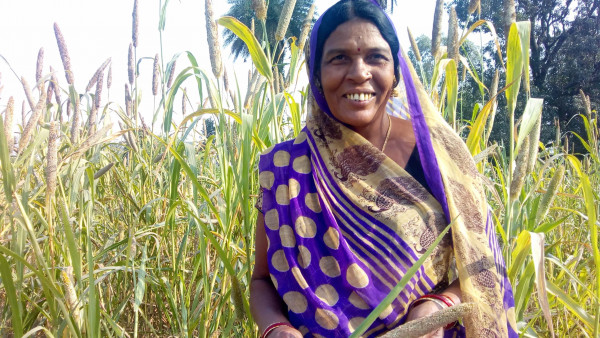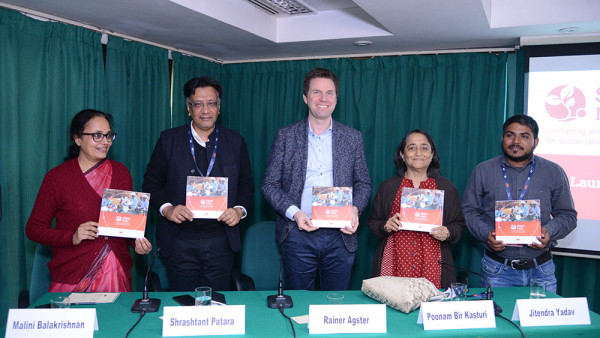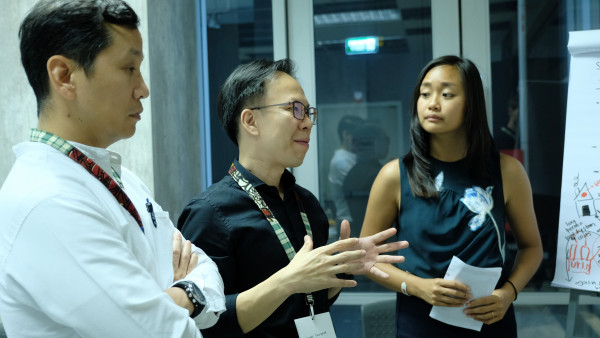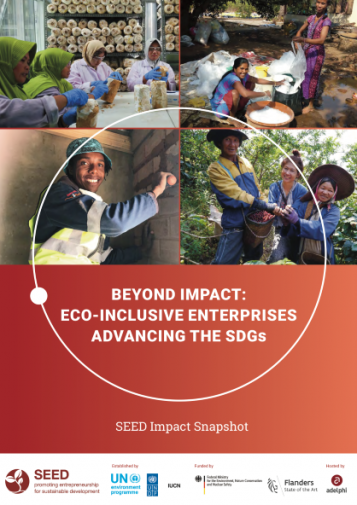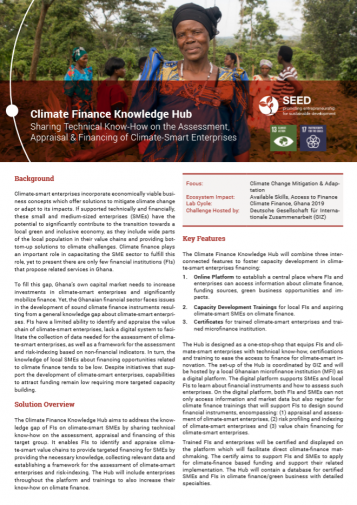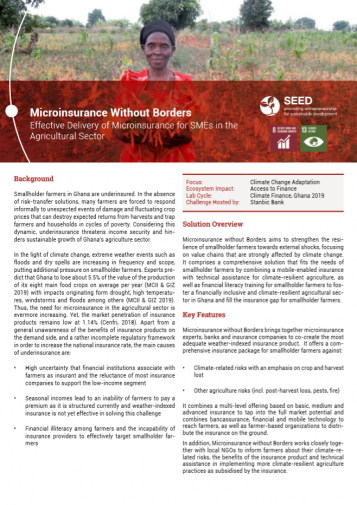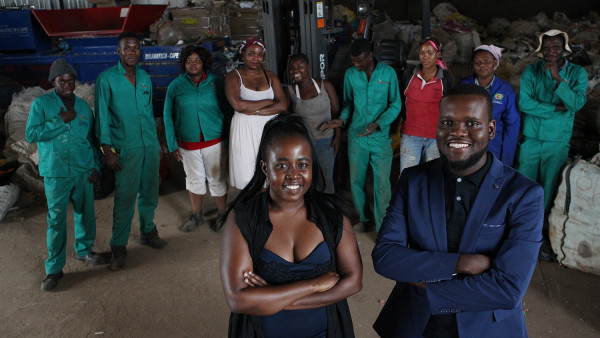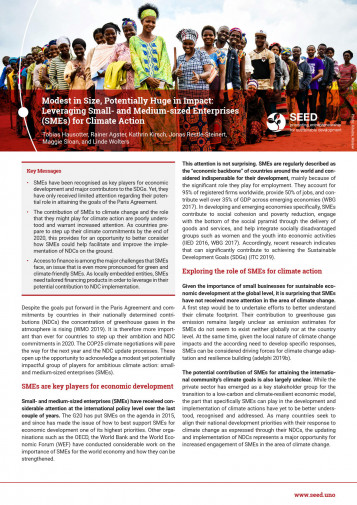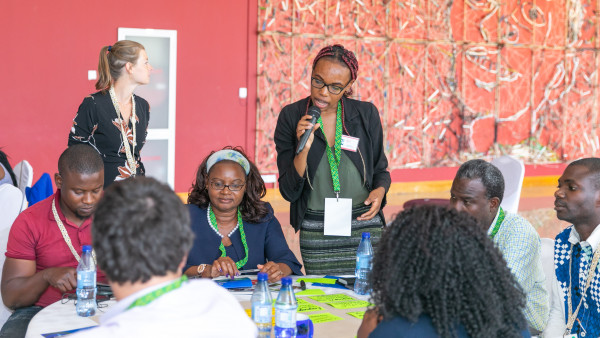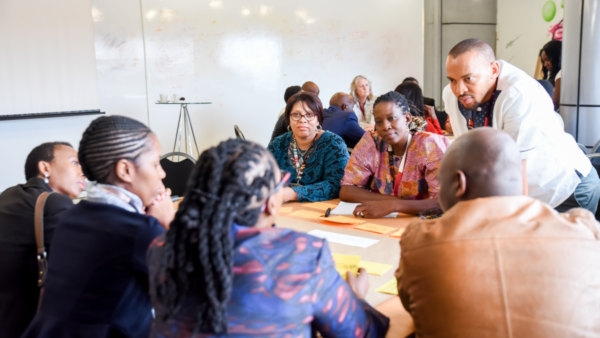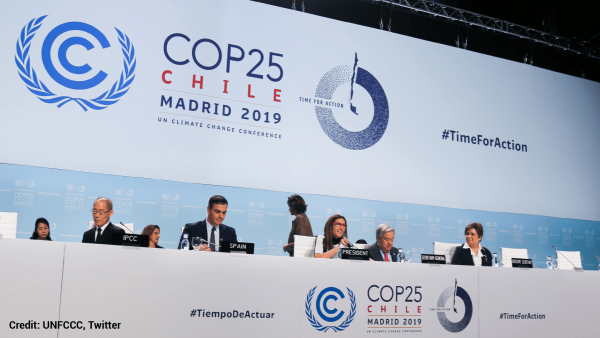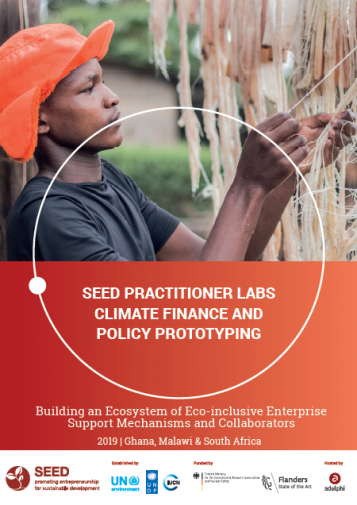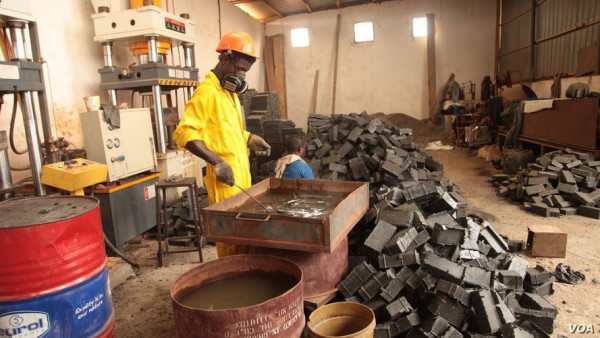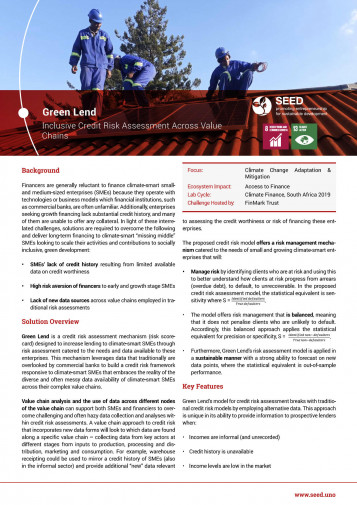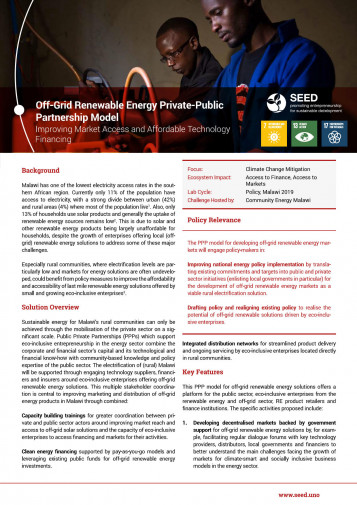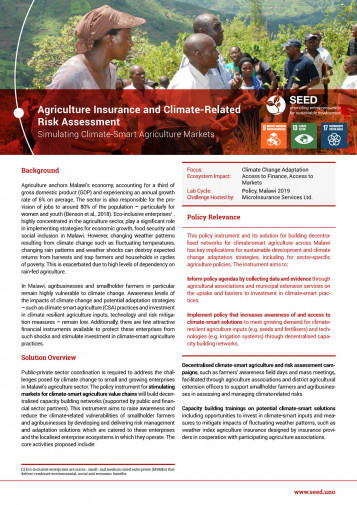BDS+ Special Focus India: Three reasons to join a Training of Trainers in India
Published: 10 April 2020 Lina Gutierrez, Linde Wolters
SEED is looking forward to bringing Training of Trainers (ToTs) workshops for Business Development Service (BDS) providers also to non-metro cities in India. SEED trains BDS providers on toolified and collaborative approaches that help early stage eco-inclusive enterprises have more impact. Read more
Digital Innovations by Eco-Inclusive Enterprises: In the Waste Sector
Published: 08 April 2020 Khawla Rammali, Sonya Ong
The improvement of waste management systems across the world is vital to reduce environmental degradation, but only 9% of the world’s plastic waste was recycled by 2015. But digital solutions can support changes in consumer behaviour and increase the education of residents on proper waste sorting techniques and the availability of door-to-door collection. Read more
SDGs:





How to improve your enterprise immunity to COVID-19? Some food for thought from SEED Indonesia Winner 2019 Mycotech
Published: 07 April 2020 Linde Wolters, Supapim Wannopas
The term “survival of the fittest” suggests that organisms best adjusted to their environment are the most successful in surviving, it seems this also applies to business in tough times.
Adaptiveness is certainly a quality that Adi Reza Nugroho, the CEO of Mycotech, an enterprise producing leather and leather products from mushrooms, has in spades. Resilient to changes, positive but not too optimistic, he hopes for the best but prepares for the worst. Here he shares his coping strategies dealing with the COVID situation. Read more
Adaptiveness is certainly a quality that Adi Reza Nugroho, the CEO of Mycotech, an enterprise producing leather and leather products from mushrooms, has in spades. Resilient to changes, positive but not too optimistic, he hopes for the best but prepares for the worst. Here he shares his coping strategies dealing with the COVID situation. Read more
SDGs:





BDS+ Special Focus Zambia: Three reasons to join a Training of Trainers in Zambia
Published: 07 April 2020 Lina Gutierrez, Linde Wolters
Through the Training of Trainers (ToT), SEED is helping Business Development Services (BDS) advisors and enterprises harness opportunities that arise from climate change. Read more
Digital Innovation for Eco-Inclusive Enterprises
Published: 30 March 2020 Khawla Rammali, Linde Wolters, Sonya Ong
Digital innovation is a great way to accelerate social, environmental and economic transformation, for enterprises to tackle challenges such as climate change, food security, gender equality, and scale-up solutions more quickly through technology. Read more
SDGs:















Digital Innovations by Eco-Inclusive Enterprises: In the Agriculture Sector
Published: 30 March 2020 Khawla Rammali, Sonya Ong
Digital innovations can bring significant benefits to stakeholders in the agriculture sector. Take rural farmers who face challenges including a lack of access to information on markets, need advice on productivity gains, and struggle with obtaining credit and low levels of financial inclusion. Read more
SDGs:











Malawian Enterprises share their Fundraising Tips for Small Enterprises
Published: 27 March 2020 Alina Weiss, Sonya Ong
Seven of our SEED Malawi eco-inclusive enterprises – Chonona, Green Impact Technologies, Green Ventures, Honey Products, Hortinet, InteWaste and Ziweto – were recently able to raise significant funds that will help them to scale-up and achieve their full impact potential. We asked them to share their fundraising journey and learnings with you. Read more
SEED Congratulates Seven Malawi Enterprises on their Latest Success
Published: 28 February 2020
Seven of our SEED Malawi eco-inclusive enterprises - Chonona, Green Impact Technologies, Green Ventures, Honey Products, Hortinet, Inte Waste and Ziweto – were recently able to raise funds that will help them scale-up and achieve their full growth potential. Read more
SDGs:















Bottom-up Solutions to the Climate Emergency: Three Innovative, Eco-Inclusive Enterprises Take a Local Approach
Linde Wolters / Marlena Kiefl / Khawla Rammali Source: Next Billion
The threat of climate change exacerbates already existing inequalities, and increases the urgency of the need for resilient communities. But building this resilience presents a complex challenge: How can the world’s most marginalized communities effectively pursue growth, work toward the Sustainable Development Goals and overcome climate-related crises – while involving the rural households, women and youth who are most affected by climate change? Read more
SDGs:













SEED หนุนอาเซียน ผลิตสินค้ารักษ์สิ่งแวดล้อม-ใช้เทคโนโลยี | SEED supports ASEAN to produce environmentally friendly products
Published: 10 February 2020
SEED Symposium Bangkok 2020 on TNN TV Thailand features SEED supported enterprises in ASEAN Read more
SEED India Hub Launch at the World Sustainable Development Summit 2020
TERI Source: TERI
Rainer Agster, Director of Operations at SEED, was present during WSDS 2020 to launch the SEED India hub and to introduce two eco-inclusive enterprises (Aikya Organics & Daily Dump) that are developing solutions for the challenges of climate change. Read more
SDGs:









SEED Symposium Bangkok 2020
Published: 23 January 2020
The SEED Symposium Bangkok 2020 brought together 180+ enterprises, financial institutions, policy-makers, donors, business development service providers and others to develop innovative approaches and partnerships that promote social and environmental entrepreneurship in sustainable development and green economy agendas. Read more
SDGs:





Beyond impact: Eco-inclusive enterprises advancing the SDGs
Published: 17 January 2020
Small and growing enterprises are key drivers of development and employment. They account for 50% of the jobs globally, and contribute well over 35% towards the GDP of emerging economies. SEED particularly supports eco-inclusive enterprises; small, micro and medium-sized enterprises operating at the community level. They offer innovative solutions to common social and environmental issues, but also strengthen local economies. But what exactly is their impact? Can we quantify it, and how do we stimulate it?
Have a look at our 2020 SEED Impact Snapshot, a snapshot of the impact of Asia an Africa based eco-inclusive enterprises on the SDGs. Read more
Have a look at our 2020 SEED Impact Snapshot, a snapshot of the impact of Asia an Africa based eco-inclusive enterprises on the SDGs. Read more
SDGs:















Climate Finance Knowledge Hub: Sharing Technical Know-How on the Assessment, Appraisal & Financing of Climate-Smart Enterprise | Climate Finance, Ghana 2019
Published: 14 January 2020 Kathrin Kirsch, Marlena Kiefl
The Climate Finance Knowledge Hub aims to address the knowledge gap of FIs on climate-smart SMEs by sharing technical know-how on the assessment, appraisal and financing of this target group. It enables FIs to identify and appraise climate-smart value chains to provide targeted financing for SMEs by providing the necessary knowledge, collecting relevant data and establishing a framework for the assessment of climate-smart enterprises and risk-indexing. The Hub will include enterprises throughout the platform and training to also increase their know-how on climate finance. Read more
SDGs:



Microinsurance Without Borders Effective Delivery of Microinsurance for SMEs in the Agricultural Sector | Climate Finance, Ghana 2019
Published: 14 January 2020 Kathrin Kirsch, Marlena Kiefl
Microinsurance without Borders aims to strengthen the resilience of smallholder farmers towards external shocks, focusing on value chains that are strongly affected by climate change. It comprises a comprehensive solution that fits the needs of smallholder farmers by combining a mobile-enabled insurance with technical assistance for climate-resilient agriculture, as well as financial literacy training for smallholder farmers to foster a financially inclusive and climate-resilient agricultural sector in Ghana and fill the insurance gap for smallholder farmers Read more
SDGs:



SEED Low Carbon Award Finalist Siyabuddy Recycling and Waste Management Featured on Reuters
Nellie Peyton Source: Reuters
SiyaBuddy is featured as an enterprise that is helping to tackle problems from illiteracy to pollution across Africa by Reuters. SiyaBuddy is a recycling and waste management company in South Africa that aims to create jobs while helping the environment. The start-up buys waste from local collectors, mostly women, and sells it to recycling companies. Read more
SDGs:





Modest in Size, Potentially Huge in Impact: Leveraging Small- and Medium-sized Enterprises (SMEs) for Climate Action
Published: 23 December 2019 Jonas Restle-Steinert, Kathrin Kirsch, Linde Wolters, Maggie Sloan, Rainer Agster, Tobias Hausotter
Despite the goals put forward in the Paris Agreement and commitments by countries in their nationally determined contributions (NDCs) the concentration of greenhouse gases in the atmosphere is rising (WMO 2019). It is, therefore, more important than ever for countries to step up their ambition and NDC commitments in 2020. The COP25 climate negotiations will pave the way for the next year and the NDC update processes. These open up the opportunity to acknowledge a modest yet potentially impactful group of players for ambitious climate action: small- and medium-sized enterprises (SMEs). Read more
SDGs:







Bringing SME voices into policy solution development through our Practitioner Labs for Policy Prototyping
Published: 16 December 2019 Camilla Shearman
In late October, seven policy practitioners took to the stage during the SEED Practitioner Labs for Policy Prototyping scale-up labs in South Africa and Malawi. The practitioners shared their ideas of policy solutions to leverage the potential of eco-inclusive enterprises in driving the transition to green and inclusive economies. Read more
SDGs:















SEED Malawi National Dialogue Forum 2019
Published: 12 December 2019
Brought together around 130+ entrepreneurs, policymakers, financial institutions, business development service providers and others to celebrate the journeys of eco-inclusive enterprises and collaboratively mobilise support for building the capacities of socially inclusive and environmentally sustainable entrepreneurship in Southern Africa. Read more
SDGs:









SEED at the COP25 in Madrid
Published: 11 December 2019
SEED’s Executive Director Dr. Lewis Akenji was present in Madrid and participated in multiple events to share how SEED supports climate-smart small and medium sized enterprises to develop innovative solutions to major climate finance challenges. As well as the innovative approaches of the SEED Low Carbon Award Winners & Finalists to reduce plastic waste. Read more
SEED Practitioner Labs 2019
Published: 25 November 2019 Alina Weiss, Camilla Shearman, Julia Haack, Kathrin Kirsch, Maggie Sloan, Marlena Kiefl
This brochure gives an overview of the 16 climate finance solutions and policy instruments developed during the 2019 SEED Practitioner Labs Climate Finance and Policy Prototyping in Ghana, Malawi, and South Africa.
This year, the labs brought together over 320 policy makers, financial institutions, civil society, research organisations, intermediaries and eco-inclusive enterprises to co-create solutions to financial and policy barriers facing eco-inclusive enterprises as they look to start and scale their ideas. Read more
This year, the labs brought together over 320 policy makers, financial institutions, civil society, research organisations, intermediaries and eco-inclusive enterprises to co-create solutions to financial and policy barriers facing eco-inclusive enterprises as they look to start and scale their ideas. Read more
SDGs:



Ghana’s Innovation and Startup Culture Thriving
Stacey Knott Source: Voice of America
Nelson Boateng's enterprise Nelplast (SEED Winner 2019) that creates bricks from recycled plastic and sand is featured in VOA as an innovative startup in Ghana. Read more
SDGs:





Green Lend: Inclusive credit risk assessment across value chains | Climate Finance, South Africa 2019
Published: 24 November 2019 Maggie Sloan
This credit risk assessment mechanism aims to increase lending to climate-smart SMEs through risk scorecard development that incorporates alternative data across enterprise value chains. Read more
SDGs:



Off-grid renewable energy private-public partnership model: Improving market access and affordable technology financing | Policy, Malawi 2019
Published: 13 November 2019 Alina Weiss, Maggie Sloan, Marlena Kiefl
his private-public partnership model furthers the electrification of (rural) Malawi by engaging technology suppliers, financiers and government around eco-inclusive enterprises offering off-grid renewable energy solutions and delivering capacity building for integrated distribution networks and targeted clean energy financing solutions. Read more
SDGs:





Agriculture Insurance and Climate-Related Risk Assessment: Stimulating Climate-Smart Agriculture Markets | Policy, Malawi 2019
Published: 13 November 2019 Alina Weiss, Maggie Sloan, Marlena Kiefl
The policy instrument for stimulating markets for climate-smart agriculture value chains, combining agriculture insurance and climate-related risk assessment, will build decentralised capacity-building networks (supported by public and financial sector partners). This instrument aims to raise awareness and reduce the climate-related vulnerabilities of smallholder farmers and agribusinesses by developing and delivering risk management and adaptation solutions which are catered to these enterprises and the localised enterprise ecosystems in which they operate. Read more
SDGs:






